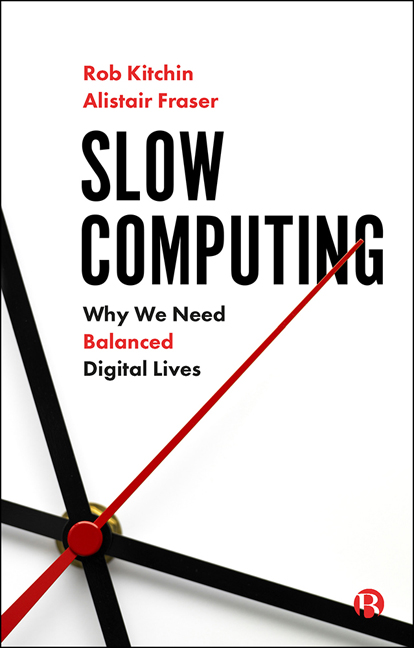Book contents
- Frontmatter
- Dedication
- Contents
- About the authors
- Acknowledgements
- 1 Living Digital Lives
- 2 Accelerating Life
- 3 Monitoring Life
- 4 Personal Strategies of Slow Computing
- 5 Slow Computing Collectively
- 6 An Ethics of Digital Care
- 7 Towards a More Balanced Digital Society
- Coda: Slow Computing During a Pandemic
- Notes
- Index
1 - Living Digital Lives
Published online by Cambridge University Press: 12 March 2021
- Frontmatter
- Dedication
- Contents
- About the authors
- Acknowledgements
- 1 Living Digital Lives
- 2 Accelerating Life
- 3 Monitoring Life
- 4 Personal Strategies of Slow Computing
- 5 Slow Computing Collectively
- 6 An Ethics of Digital Care
- 7 Towards a More Balanced Digital Society
- Coda: Slow Computing During a Pandemic
- Notes
- Index
Summary
Monday. The week begins. It's 6.30am. You’ve been woken by your phone's alarm. You immediately reach for the device, noticing there are WhatsApp messages waiting to be read. An icon from Twitter is also alerting you to something, perhaps a new follower. Your partner has been up for a while. In the living room, Amazon's Alexa has begun streaming some songs from Spotify. You know you need to check email. Then check your calendar to see what meetings you have scheduled in the afternoon. You notice your ‘bedtime’ tablet, which you use to watch Netflix, is flashing to be charged. “There's something wrong with the screen on the fridge,” your partner says. Time to get up.
This start to the day won't be exactly the same as yours. You’ll have your own array of devices. You might not use Twitter. Maybe you live on your own. And maybe you don't (yet) have a screen on your fridge. But for many of us today, regardless of how we go about waking up, we soon start to connect and interact with digital devices and services. In fact, according to a 2017 report by Deloitte, 16% of Americans reach for their smartphone immediately after waking, 42% within five minutes, and 62% check for messages, email, social media, and the news within 15 minutes.
We lead digital lives. Twenty-six per cent of Americans report being ‘almost constantly’ online. Over 80% of people own a smartphone, with the average person checking it about 50 times a day. A large proportion have it at hand at all times, even when asleep. We often check in during the night; a 2017 survey in the UK found that 66% of teenagers wake to check their phone in the early hours, with 35% of parents doing the same. And even if we do not own a smartphone, or use the internet infrequently, we still interface with digitally mediated services all the time – at work, moving through transport systems, using utilities, passing surveillance cameras, and so on.
Is this just the way life is now? Should it be like this? Does it matter at all?
In this book we make two related arguments. First, how we interact with digital devices does matter. Digital technologies are accelerating and fragmenting our everyday lives, and the data our devices gather are used to profile and target us.
- Type
- Chapter
- Information
- Slow ComputingWhy We Need Balanced Digital Lives, pp. 1 - 19Publisher: Bristol University PressPrint publication year: 2020



